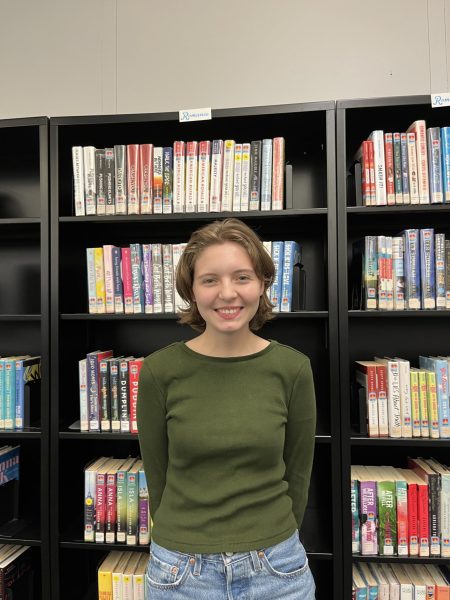Book Banning in Glenbard
February 7, 2023
From the “readers are leaders” catchphrase rattling in almost every elementary school classroom to each teacher at Glenbard South having a “What am I reading?” poster proudly displayed in their room, in school reading has been unequivocally encouraged. Books are always seen as a good idea. However, some books: Gender Queer by Maia Kobabe, Flamer by Mike Curato and All Boys Aren’t Blue by George M. Johnson are books being questioned if they belong in Glenbard libraries and in student’s hands.
Everyone wants what’s best for their kids, and for some community members, that means the banning of books deemed inappropriate for students to read in Glenbard libraries, while for others book banning is simply not the answer.
Gender Queer by Maia Kobabe and Pornographic Content
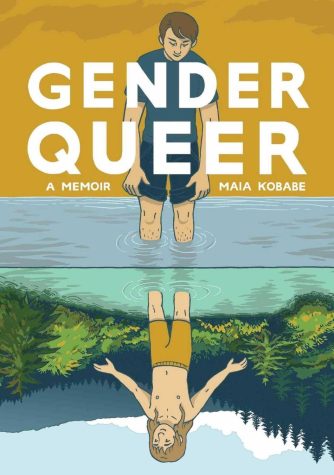
Gender Queer by Maia Kobabe has been brought to attention due to the alleged pornographic images it depicts.
Kobabe believes that the banning of eir book is unique as it is a graphic novel, “people can very quickly flip open to one or two images that they don’t agree with or make them uncomfortable and share those out of context,” said Kobabe in an interview defending eir book.
Ms. Amanda Raymond, a chemistry teacher at Glenbard South, read Gender Queer by Maia Kobabe. Ms. Raymond’s interest in reading Gender Queer was sparked by her role as the sponsor of the Gender Equality club at Glenbard South.
“I felt it was very informational because I have a lot of students who are transgender or questioning and I think it’s really opened my eyes to a lot of things and to kind of understand what it is like to grow up like them in a way I feel like,” said Raymond.

When asked if she felt the book was inappropriate for students Raymond shared, “the media that kids are watching today, it’s so much worse than that.” “It’s a cartoon,” continued Raymond when describing the images that some are calling into question. Raymond points to one such image of two boys kissing each other naked with an exposed butt and back being depicted.
“Pictures of kids having sex in books do not belong in school libraries, pictures of naked kids in books do not belong in school libraries,” said one community member at a recent board meeting, questioning the validity of these titles in Glenbard libraries. “Is it pornographic or is it not?” Was the question raised by community members concerning these books.
This particular image, of two boys kissing naked, has been used by those outside and inside the Glenbard district to flag the book as inappropriate, but according to the author the image is based on the motifs seen on Greek pottery vases, specifically a vase that is held in the Bodleian museum library collection in England. Kobabe was inspired by Plato’s Symposium, a classic Greek work that Kobabe read in school.
“If you don’t want to read it, don’t read it. But if you want to read it or your kid wants to read it, that’s a family issue right there. It’s not a required book,” said Raymond.
Raymond continued that the book banning saddens her as, “we have students that I know are questioning and not sure of what they’re going through and seeing that this is a memoir.”
Flamer by Mike Curato and Graphic Language
Flamer has been banned in other districts for its graphic language around sexuality and uses slurs against gay people. The book follows the main character, Aiden Navarro, while he is on a scouting trip. Aiden is bullied for the way that he looks and acts and there is also a depiction of attempted self-harm in the book.
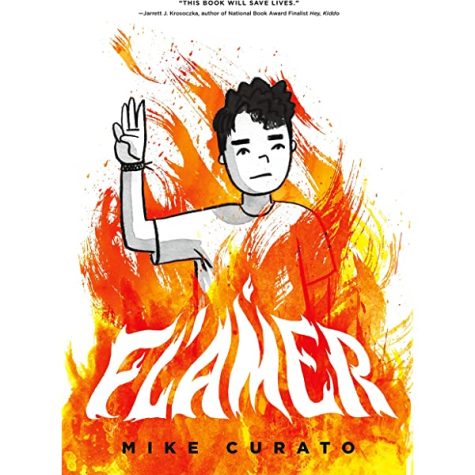
In an Instagram video Curato shared that he’s been, “receiving some hateful comments and DMs lately because of my book Flamer which has been banned in a bunch of schools and challenged in even more places and it’s been really hard and I just can’t take it anymore these messages are especially hard to read because,” said Curato with a tearful expression before adding, “the grammar is terrible.” With an eyebrow raise Curato continued, “Pro tip, if you want to be a good writer, you’ve gotta be a good reader. So instead of banning a book try reading one.” This flippant response went viral.
All Boys Aren’t Blue by George M. Johnson and Depictions of Sex
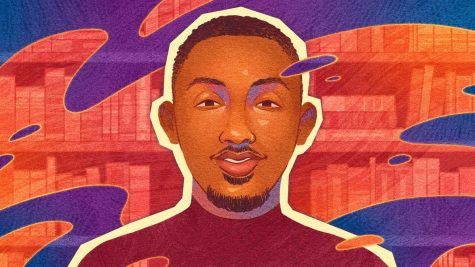
All Boys Aren’t Blue has been challenged due to its depictions of sex. The author, George M. Johnson argues for their book that while many consider the topics their book discusses as too much for teenagers to handle, as this book is based on personal experiences, teenagers are dealing with these things in real life.
In an interview with NPR Johnson expressed that, “if parents don’t want their own child to read it, they should opt them out rather than try to block all students — some who may really need the book — from accessing it.” Later in the interview Johnson said, “‘Students … have publicly said on record that works like mine have saved their lives, works like mine have helped them name their abusers, works like mine have helped them come to terms with who they are and feel validated in the fact that there is somebody else that exists in the world like them. And you want to remove that from them. I just think it’s sad.’”
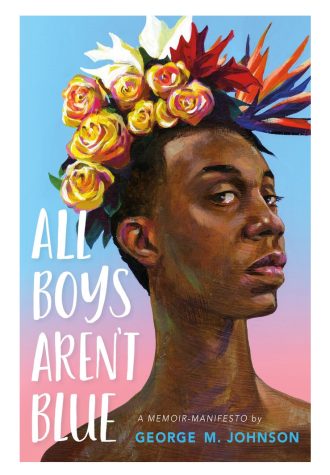
Johnson’s opinion is that while these topics are difficult to swallow, many teens are facing them in their own lives and books like his allow teens to understand that they’re not alone. For some though the explicit content is too much for students to handle.
In line with this argument one community member voiced at the December 12th board meeting that, “Everyone is allowed to voice their opinion on a book but they do not have the right to limit another person’s access to information.”
“It is understandable that parents would want to explain these heavy topics themselves but there is no reason to take part in another child’s education,” said another community member at the meeting.
More to the story?
Nationally book banning has become more and more popular, with many districts banning a wide variety of books. Currently, Gender Queer is the most banned book in the country.
Raymond continued that while these three books have been flagged for their alleged pornograhic content, being books by and about LGBTQ people gives more context to the issue. “…we’re only looking at a certain group of books,” points out Raymond.
According to an article by the ACLU reading LGBTQ books is beneficial for everyone as, “Books can expose readers to identities beyond the scope of people they know in their immediate lives— queer people with disabilities, queer people who are immigrants, queer people who wear a hijab — thereby building empathy and understanding of experiences different from their own.” But for LGBTQ students it validates their existence, as for any minority group when they see themselves in the media they consume.
“It’s imperative that students feel represented, meaning that they should see themselves represented in literature,” shared a member of PFLAG Dupage during the December 12th board meeting, an organization dedicated to advocating for and supporting LBTQ+ individuals.
Another community member who wants the books removed expressed that it had nothing to do with the LGBTQ+ content and agreed that inclusive representation is extremely important in literature but graphic content makes these books inappropriate.
In an interview with GLAAD Maia Kobabe, the author of Gender Queer shared that, “Having a book like this or any sort of book that explored specifically a non-binary identity would have probably taken ten years of confusion and uncertainty out of my life.”
Though it is a memoir of eir life Kobabe shared that, “In some ways it doesn’t really feel like a personal attack on my story, it feels like a generalized attack on a queer and trans narratives that my book has gotten swept up in.”
Trevor Noah, host of the Daily Show, hosted a segment on the uptick in banned books across the country. Noah explained that it is not about allowing just anything into the library as he cheekily references reading a Playboy magazine, “But now we’re arguing about one page in one book as if that’s the whole story.”
But one page can be all it takes to make a book inappropriate for some. The argument is that the content is there and context is irrelevant.
What does the reconsideration of library materials process look like at Glenbard
To remove books from Glenbard libraries there is a form available on the district website that can be filled out. Once the form is filled out and submitted the first step in the reconsideration process is holding a meeting with the person who filled out the form and the school’s principal and librarian, “to talk about why the book was selected and what their concerns are with the book,” said Melissa Creech, a district administer.
The second step in the reconsideration process is after the meetings at each school have happened a cross building meeting will meet to make an initial decision on whether to keep or remove the books. Creech stressed the importance of this being a district wide action.
If there are still concerns then, “we would form an ad hoc committee, our district policy says who’s on that committee, and then that committee would make recommendations,” said Creech.
Commenting on the entire process Creech shared that, “We’re really just following our policy very specifically and making sure that we have a chance to hear from the community members, hear their concerns, and they have a chance to talk to the librarian or the principal about why those books were selected.”





























